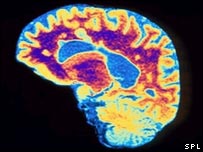
Target for new MS drugs revealed
Scientists say they have found a drug target for new therapies to aid people with multiple sclerosis.
Blocking a cell signal in the nervous system alleviated MS symptoms in mice, the German team told Nature Immunology.
Experts say more work is now needed to check that blocking this signalling molecule, called NF-kB, will achieve the same desired effect in humans.
Every week in the UK about 50 people, typically aged between 20 and 40, are diagnosed with MS.
Immune system malfunction
The exact causes of MS are not known, but it is believed that MS is caused by something foreign to the body, like a virus or a pollutant. This causes the body's immune system to malfunction and start attacking and destroying the protective myelin sheath that coats the nerves in the brain and spinal cord.
The disease affects people differently and symptoms can last for several weeks to several months at a time. Initially MS causes loss of balance, reduced vision and bouts of localised paralysis. Eventually, patients may become totally paralysed and wheelchair-bound.
Scientists have known for some time that NF-kB is involved in MS. But it was not clear whether NF-kB protected the brain cells against the consequences of the disease or aggravated the damage.
To investigate this, Dr Marco Prinz and colleagues studied genetically altered mice with an MS-like condition. In these mice it was possible to turn NF-kB on and off by manipulating two proteins, called IKK2 and NEMO, which activate the molecule. Blocking IKK2 and NEMO, thereby switching off NF-kB, alleviated MS symptoms in the mice.
Given that the human NF-kB signalling network is very similar to that of mice, the researchers believe compounds that inhibit IKK2 and NEMO should be investigated further as potential MS treatments. Dr Prinz said: "NF-kB regulates the production of messengers that are released during inflammation to recruit and activate immune cells. "Generally this is a good strategy to protect the body from infections. But in MS it is exactly these immune cells that cause the problem and their hyperactivation through NF-kB only makes the situation worse."
Chris Jones, chief executive of the MS Trust, said: "This looks exciting. More and more is being discovered about MS at the cell level." However, he stressed that much more work was needed to determine whether the same effects would be seen in humans.
Dr Lee Dunster, head of research and information at the Multiple Sclerosis Society, agreed, saying: "We have to remember that what works in mice does not unfortunately always work in men."